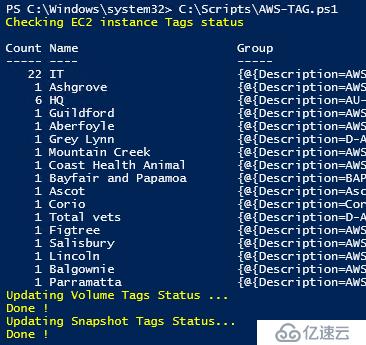公司的AWS上运行了很多不同的服务,EC2,S3,VPC等等,他们属于20多个不同的诊所。之前的管理员并没有进行很好的Tag,因此每个月底的账单都只能看见一大堆总的开支,具体到每个服务,每个诊所很难确定具体的开支,结果就是所有的开支都从IT部门的预算走的,而不是分摊到实际的各个诊所上去。
为了解决这个问题,可以对每个服务都进行自定义的Tag标签,然后在Cost Allocation Tag的控制台里激活自定义的标签,一天之后,就可以在Billing账单里面根据自己定义的标签来过滤查询了。
比如说,为了区分诊所,我定义了一个Tag,key是Clinic,value就是每个诊所的名字了

因为我有上百个volume和上千个Snapshot,豆子写了个简单的PowerShell脚本来添加标签。EC2实例上手动添加了对应的标签,然后根据EC2关联的volume添加Tag,再通过volume来关联snapshot添加Tag
Write-Host "Checking EC2 instance Tags status" -ForegroundColor Yellow
$all=Get-EC2Instance | select -expand instances
$return=$all | Where-Object {$_.tag.key -notcontains "Clinic"}
if($return -ne $null){
$username = "example@aa.com"
$password = "password" | ConvertTo-SecureString -asPlainText -Force
$credential = New-Object System.Management.Automation.PSCredential($username,$password)
Send-MailMessage -From example@aa.com -to example@bb.com -SmtpServer smtp.office365.com -Port 587 -UseSsl -Subject "EC2 instance Tag" -Credential $credential
exit
}
# confirm EC2 instances were tagged
$result=@()
foreach($item in $all){
$Name=$item.tag | Where-Object {$_.Key -eq 'Name'} | select -ExpandProperty value
$clinic=$item.tag | Where-Object {$_.Key -eq 'clinic'} | select -ExpandProperty value
$item | add-member -NotePropertyName Description -NotePropertyValue $name
$item | add-member -NotePropertyName Clinic -NotePropertyValue $clinic
$item = $item | select *
$result+=$item
}
$result | select Description, InstanceId, privateIpaddress, Clinic | Group-Object Clinic
write-host "Updating Volume Tags Status ... " -ForegroundColor Yellow
#Tag all volumes based on their attached EC2 Clinic Tag
$allvol=Get-EC2Volume | Where-Object {$_.tag.key -notcontains "Clinic"}
foreach($item in $result){
foreach($item2 in $allvol){
if ($item2.attachments.instanceid -eq $item.InstanceId){
$value=$item.Clinic
New-EC2Tag -Resource $item2.VolumeId -Tag @{Key="Clinic";value=$value}
}
}
}
write-host "Done !" -ForegroundColor Yellow
Write-Host "Updating Snapshot Tags Status..." -ForegroundColor Yellow
#Tag all snapshots based on the volume Tag
$allvol=Get-EC2Volume
$filter= New-Object Amazon.EC2.Model.Filter -Property @{Name = "owner-id"; Values ='xxxxxxx' }
$snapshots=Get-EC2Snapshot -Filter $filter
$snapshots= $snapshots | ? {$_.Tag.key -notcontains "Clinic"}
foreach($i in $snapshots){
$volid=$i.VolumeId
foreach($j in $allvol){
if($volid -eq $j.Volumeid){
$value=$j.tag | Where-Object {$_.key -eq 'Clinic'} | select -ExpandProperty value
$name=$j.Tag | Where-Object {$_.key -eq "Name"} | select -ExpandProperty value
$snapid=$i.snapshotid
$snapid
New-EC2Tag -Resource $snapid -Tag @{Key="Clinic";value=$value}
New-EC2Tag -Resource $snapid -Tag @{Key="Name";value=$name}
}
}
}
write-host "Done !" -ForegroundColor Yellow
执行之后大概是这样, 确认工作之后把他放到任务计划里面自动跑就行了

然后过了24小时,登录billing的控制台,根据Tag来分类,就可以看见每个诊所的开支记录了

免责声明:本站发布的内容(图片、视频和文字)以原创、转载和分享为主,文章观点不代表本网站立场,如果涉及侵权请联系站长邮箱:is@yisu.com进行举报,并提供相关证据,一经查实,将立刻删除涉嫌侵权内容。